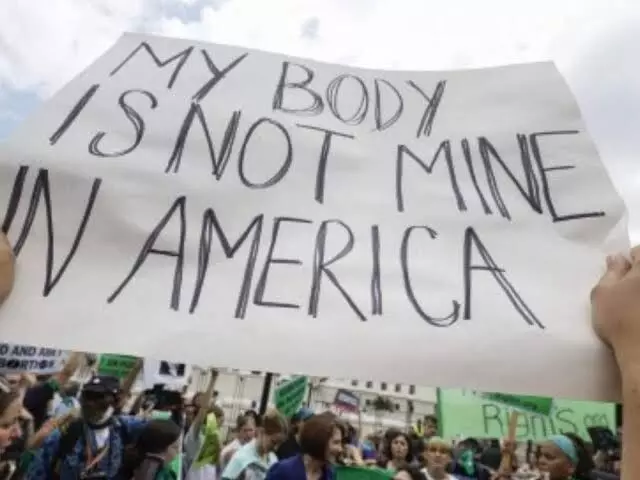
In seismic ruling, US Supreme Court ends 50 years of federal abortion rights
text_fieldsWashington: In a seismic ruling, the Supreme Court on Friday ended constitutional protections for abortion that had stood in America for nearly a half-century. The decision by the court's conservative majority overturned the landmark Roe v. Wade ruling and is expected to lead to abortion bans in roughly half the states.
The conservative-dominated court overturned the landmark 1973 "Roe v Wade" decision that enshrined a woman's right to an abortion, saying that individual states can now permit or restrict the procedure themselves.
"The Constitution does not confer a right to abortion; Roe and Casey are overruled, and the authority to regulate abortion is returned to the people and their elected representatives," the court said.
In the majority opinion, Justice Samuel Alito said "abortion presents a profound moral issue on which Americans hold sharply conflicting views.
"The Constitution does not prohibit the citizens of each State from regulating or prohibiting abortion," he said.
The ruling will likely set into motion a cavalcade of new laws in roughly half of the 50 US states that will severely restrict or outright ban and criminalize abortions, forcing women to travel long distances to states that still permit the procedure.
Women in America no longer have the fundamental right to seek an abortion, with the verdict opening the doors for states to impose an outright ban on abortion or severely curtail it. Minutes after the judgment, Missouri became the first American state to ban abortion.
The court's ruling goes against an international trend of easing abortion laws, including in such countries as Ireland, Argentina, Mexico, and Colombia where the Catholic Church continues to wield considerable influence.
It represents a victory over 50 years of struggle against abortion by the religious right but the anti-abortion camp is expected to continue to push for an outright nationwide ban.
The ruling was made possible by the nomination of three conservative justices to the court by former Republican president Donald Trump -- Neil Gorsuch, Kavanaugh and Amy Coney Barrett.
The case before the court was a Mississippi law that would restrict abortion to 15 weeks but during the hearing of the case in December, several justices indicated they were prepared to go further.
According to the Guttmacher Institute, 13 states have adopted so-called "trigger laws" that will ban abortion following the move by the Supreme Court.
Ten others have pre-1973 laws that could go into force or legislation that would ban abortion after six weeks, before many women even know they are pregnant.
Women living in states with strict anti-abortion laws will either have to continue with their pregnancy, undergo a clandestine abortion or obtain abortion pills, or travel to another state where the procedure remains legal.
Several Democratic-ruled states, anticipating an influx, have taken steps to facilitate abortion and clinics have also shifted their resources.





